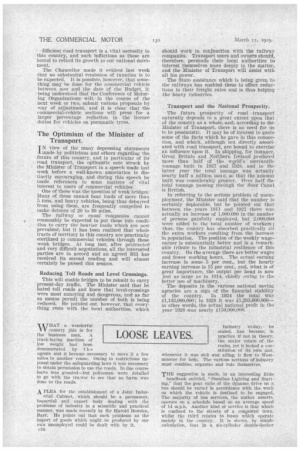Reducing Toll Roads and Level Crossings.
Page 48

If you've noticed an error in this article please click here to report it so we can fix it.
This will enable bridges to be rebuilt to carry present-day traffic. The Minister said that he hated toll roads and knew that level-crossings were most annoying and dangerous, and as far as .means permit the number of both is being reduced. He pointed out, however, that everything rests with the local authorities, which should work in conjunction with the railway companies. Transport users and owners should, therefore, persuade their local authorities to interest themselves more deeply in the matter, and the Minister of Transport will assist with all his power.
The State assistance which is being given 'to the railways has enabled them' to effect reductions in their freight rates and is thus helping the heavy industries.
• Transptirt and the National Prosperity.
• The future prosperity of road transport naturally depends to a great extent upon that of the country as a whole, and, -according to the Minister of Transport, there is no need for •us to be pessimistic. It may be of interest to quote some of the facts which he gave in this connection, and which, ,although not directly associated with road transport, are bound to exercise an influence upon it. Ip shipping, for Instance, Great Britain and Northern Ireland produced More than half of the world's mercantile tonnage built in 1927 and 1928, and in the latter year the total' tonnage, tonnage was actually nearly half a million mote, so that the amount built was considerably greater. Over half the total tonnage passing through the' Suez Canal is British.
In referring to the serious problem of unemployment, the Minister said that the number is certainly deplorable, but he pointed out that between the years 1911 and 1921 there was actually an increase of 1,000,000 in the number of persons gainfully employed, but 2,000,000 were added to the total number of workers ; thus, the country has absorbed practically alt the extra workers .resulting from the increase in population. The position of the weekly wageearner is substantially better and is a temarkable tribute to the industrial resilience of this country. On the average there are better wages and fewer working hours. The actual earning increase is some 5 per cent., but the hourly earning increase is 15 per cent., and, what is of great importance, the output per head is now just as large as in 1914, chiefly owing to the better use of machinery. .
The deposits in the various national saving agencies are a sign of the financial stability of the country. In 1924 the total was £1,133,000,000; in 1928 it was £1,295,000,000— in other words, the actual national profit in the year 1928 was nearly .£150,000,000.




























































































































